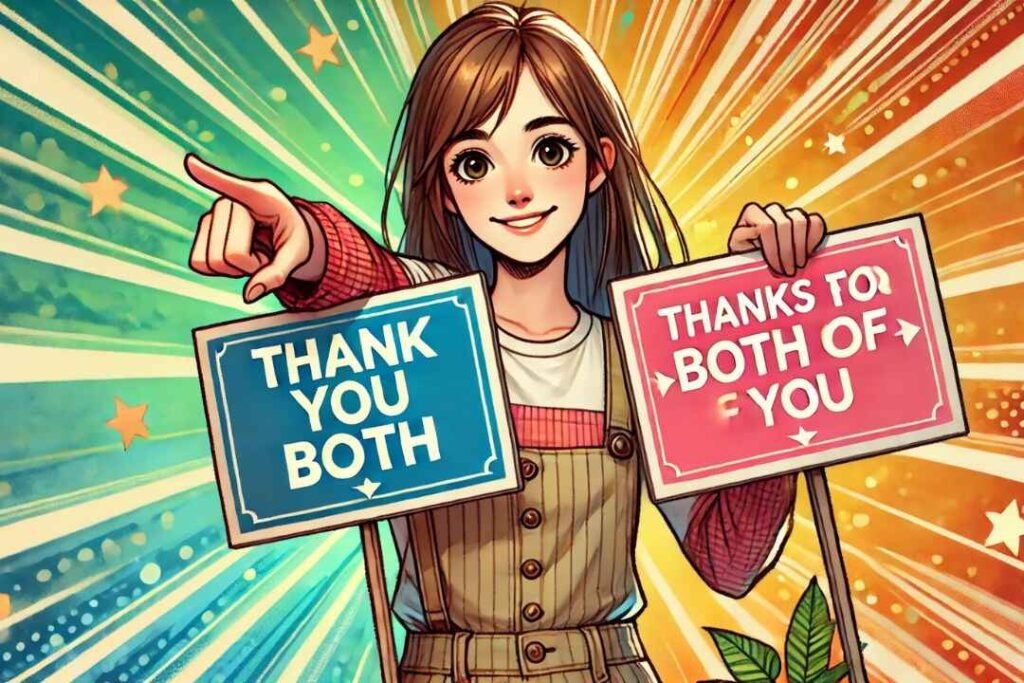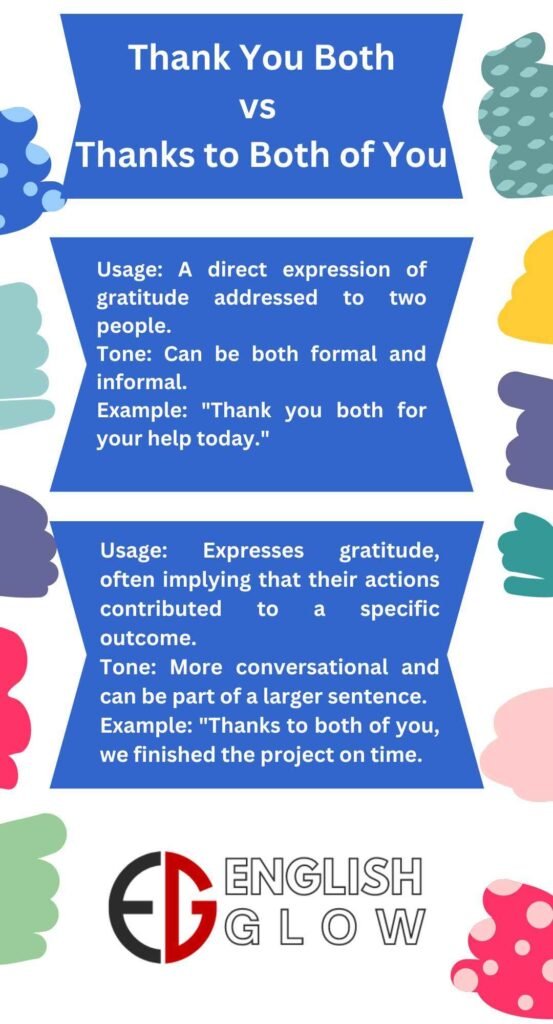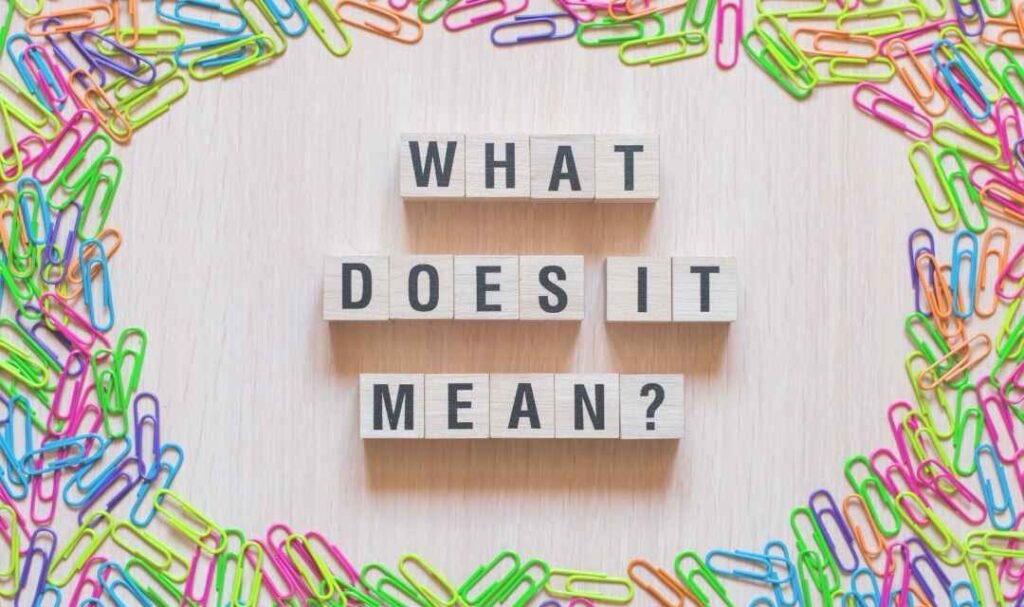When it comes to expressing gratitude, knowing the differences between thank you both and thanks to both of you is important for understanding the subtle nuances in communication. Both phrases are polite expressions that allow you to express appreciation to two individuals, but they serve slightly different purposes. Thank you both is a more concise and direct way of showing thanks, acknowledging the efforts and assistance of the people involved in a specific situation. This makes it perfect when you want to be clear and straightforward in your message.
On the other hand, thanks to both of you, it adds a layer of attribution, emphasising the role of both individuals in contributing to a particular outcome. It creates a more conversational tone and is often used when expressing gratitude in front of a group. While both phrases are equally appropriate, the choice depends on the context and the level of formality you want to convey. These common expressions have evolved as part of the general development of the English language and social customs, and while they may not have a specific historical origin, they are naturally traced back to the way people express kindness and appreciation in everyday life.
Thank You Both vs Thanks to Both of You: Key Differences Explained
When expressing gratitude, both thank you and thanks to both of you are correct phrases used to appreciate two people. However, there are subtle distinctions in how these phrases are applied. Thank you both” is a more straightforward and personal way to express gratitude when addressing exactly two people. This phrase is often used in private settings, focusing on the individuals’ contributions or efforts without a need for an audience.
On the other hand, thanks to both of you is more appropriate when you’re in front of a group or audience, recognizing the efforts of two people. The difference here lies in the subtle shift in formality. While both phrases convey the same meaning, “thank you both” feels more intimate, whereas “thanks to both of you” can create a slightly more formal tone, especially in public settings. These terms are often used interchangeably, but the distinctions come from the context in which they are applied. It’s always important to consider the situation when deciding which phrase to use to ensure the right level of appreciation and formality is conveyed.
Thank You Both or Thanks to Both of You: Which One is Correct?
The truth is, both thank you both and thanks to both of you are grammatically correct. However, they are used in different situations depending on the formality and context. Thank you both is a more direct expression of gratitude, often used when thanking two individuals in a straightforward and formal manner. This is ideal when you are directly speaking to two people in a private setting, like in a conversation or small meeting.
On the other hand, thanks to both of you can feel more informal and has a slightly conversational tone. It might be more appropriate when you’re giving a speech or thanking two people in front of a larger group. This phrase highlights the individual contributions of both people and creates a friendly rapport, making it fitting for less formal occasions. Both phrases serve the same purpose, but the choice depends on the level of formality and the context in which you’re expressing appreciation.
30 Practical Sentences Using ‘Thank You Both’ in Everyday Conversation
- have done this without your teamwork—thank you both.
- Your dedication has not gone unnoticed—thank you both for always going above and beyond.
- Thank you both for your kindness and unwavering support.
- Thank you both for the guidance and mentorship you’ve provided me throughout this project.
- Your efforts mean a lot—thank you both for making a difference.
- Thank you both for your heartfelt commitment to this challenging time.
- The world is better because of people like you—thank you both for being amazing friends.
- Thank you both for being so reliable and trustworthy during this project.
- I owe a great deal to you—thank you both for your incredible contributions.
- Your work has made a significant impact—thank you both for your generosity and believing in the vision.
- Thank you both for pushing me to be my best and always encouraging me.
- You’ve made a positive difference—thank you both for your unwavering support.
- Thank you both for your encouragement during this tough time; it has meant the world to me.
- From the deepest part of my heart, thank you both for your patience and understanding.
- Your collaboration is truly commendable—thank you both for your excellent teamwork.
- Thank you both for your sincere friendship; it’s truly priceless to me.
- The project was a success because of your professionalism and expertise—thank you both.
- It’s been a pleasure working with you—thank you both for your positive attitude and enthusiasm.
- Thank you both for your help during this challenging time—I couldn’t have done it without you.
- Your dedication to everything you do is inspiring—thank you both for your invaluable contributions.
- Thank you both for coming to our engagement party—it really meant a lot to us.
- I really like to thank you both for being such wonderful friends.
- Thank you both for your incredible efforts in ensuring that the girl has a bright future.
- The footage looks fantastic—thank you both for giving me a fresh angle for my project.
- Info and review were completed by Roberto Merico and Dana Carville—thank you both for your hard work.
- So I would like to thank you both for giving me the best present a mom could ever receive
- Thank you both for your invaluable assistance with this project.
- Thank you both for the support you’ve provided—it’s been truly appreciated.
- I want to express my deepest gratitude—thank you both for all the help.
- Thank you both for all the time and effort you’ve put into this task.
30 Sentences Featuring ‘Thanks to Both of You’ for Everyday Use
- Thanks to both of you, the project was a huge success.
- We finished ahead of schedule, thanks to both of you.
- Thanks to both of you, we’ve met all our goals.
- The event went perfectly, thanks to both of you.
- Thanks to both of you, we were able to overcome all the challenges.
- This wouldn’t have been possible without your help—thanks to both of you.
- Thanks to both of you, the team performed exceptionally well.
- Thanks to both of you, we now have a clear plan going forward.
- The meeting ran smoothly, thanks to both of you.
- Thanks to both of you, we were able to close the deal.
- The presentation was flawless, thanks to both of you.
- We got the contract signed, thanks to both of you.
- The entire process was seamless, thanks to both of you.
- We managed to resolve the issue, thanks to both of you.
- The department is thriving thanks to both of you and your hard work.
- The project exceeded expectations, thanks to both of you.
- We reached our fundraising target, thanks to both of you.
- Thanks to both of you, the new system is working perfectly.
- The client’s feedback was excellent—thanks to both of you.
- Thanks to both of you, we’ve established a stronger relationship with the client.
- The website looks great thanks to both of you.
- Thanks to both of you, our sales have increased significantly.
- We’ve successfully completed the task, thanks to both of you.
- Thanks to both of you, we’ve launched the product on time.
- Thanks to both of you, the company is in a better position now.
- The team’s morale is high thanks to both of you.
- Our efficiency has improved thanks to both of you.
- Thanks to both of you, the transition went smoothly.
- The project received great reviews, thanks to both of you.
- Thanks to both of you, we’ve created something truly outstanding.
You might enjoy: Reinforce vs Reenforce: Surprising Facts You Need to Know
The True Meaning of ‘Thanks’ and How to Use It”
The word thanks is often used to express gratitude or appreciation. It is a way to show kindness and acknowledge the efforts or help provided by someone. The term thanks can be used in both formal and informal settings, depending on the tone and situation. In its simplest form, thanks is an expression of gratitude that allows us to recognize the support or assistance received from others, making it an essential part of everyday communication.
When you say thanks, you’re acknowledging that someone’s actions made a positive difference in your life. It’s a short yet powerful word that conveys a lot of meaning. Whether you’re thanking someone for a small favor or a significant contribution, thanks highlights the importance of their actions. It’s also a way to extend heartfelt recognition and to express your gratitude for their help. Saying thanks creates a sense of connection and shows that you appreciate the other person’s effort.
What is the Meaning of ‘Both’? Learn Its Correct Usage
Both, as a determiner or predeterminer, serves a crucial role in expressions of gratitude. It’s often used to indicate inclusion of two people or things within the sentence, bringing them together as a coordinated unit. This usage is particularly apparent in phrases like “thank you both” or “thanks to both of you,” where the speaker emphasises their appreciation for the recipients. Whether it’s thanking a couple who hosted a dinner or acknowledging a group for their collaborative work, “both” ensures that attention is equally divided, underscoring that both actors played significant roles.
In my experience, especially during a time I had to address a room full of colleagues, the phrase “thank you both” was invaluable. I had just received an award, and it was crucial to emphasise my gratitude towards one person for their mentorship and the other for their unwavering support. By using “both,” I could convey my gratefulness more effectively, ensuring that neither felt their contribution was downplayed. This word functions not just as a bridge but as a tool to express appreciation more emotionally and correctly, fitting various contexts and maintaining the meaning and respect intended in these expressions.
How to Properly Pronounce ‘Thank You Both’ and ‘Thanks to Both of You
Pronunciation of the phrases “thank you both” and “thanks to both of you” might seem straightforward, but it’s a vital aspect often overlooked when learning English. Mastering how to pronounce these expressions correctly enhances your speech, whether in a casual thank or during a formal presentation in front of a group. Here’s a quick phonetic guide for reference:
- Thank you both: /ˈθæŋk juː boʊθ/
- Thanks to both of you: /ˈθæŋks tʊ boʊθ əv juː/
Using these phonetic spellings ensures that you use the right sounds, helping to convey your appreciation more clearly and effectively. This approach has been important in my own experiences, particularly when addressing diverse audiences where clarity in pronunciation can significantly impact the reception of the message.
When to Say ‘Thank You Both’ or ‘Thanks to Both of You’: Writing Guide
Thank you both” is used for:
- Directly speaking to two people
- Keeping the acknowledgment simple and personal
- Appropriate for casual or intimate settings
- Example: “Thank you both for being here today; I’m glad we could meet.”
Thanks to both of you” is used for:
- Acknowledging accomplishments or contributions in a formal or public setting
- Often used in front of a group to emphasize the impact of efforts
- Ideal for conveying gratitude when public recognition of achievements is appropriate
- Example: “I appreciate both of you for your hard work and dedication.”
Thanks to’ as an Idiom
The phrase “thanks to” is often used as an idiom to express the idea that something happened or was achieved with the help of someone else. It adds an interesting twist to the sentence structure and can be used either genuinely or even sarcastically. For instance, you might say, “Thanks to my parents, I found out about the new job vacancy posted online,” showing gratitude for their support. However, in another context, it can be used more humorously, like when you tell your friends, “Thanks to Sally and Hannah, we missed the train,” when they made you late. Knowing when to use this term correctly helps avoid using it in an incorrect context..
You might enjoy: Too Cute vs To Cute: Discover the Charming Difference
How to Express Thanks to a Group of More Than Two People
When expressing thank you to more than two people, the phrase you choose can impact the tone and inclusiveness of your message. Previously, the phrase “thank you both” was often applied to groups of two people. However, when thanking a larger group of people, it’s essential to adjust the context for accuracy and politeness. Using “thank you all” or “thanks to everyone here” is more appropriate for groups larger than two, especially when you want to show gratitude to a supportive family or team. Each phrase adds a personal touch, ensuring no one feels left out.
In contrast, “thanks to both of you” is typically used in situations involving just two people. If you’ve ever been in a situation where multiple people supported you, you may have found it more suitable to say “thanks to each and every one of you” or “thanks to all of you” instead. These examples emphasize the effort of the entire group and make the gratitude feel more heartfelt. Whether you’re thanking everybody, everyone, or a specific group, choosing the correct words ensures your appreciation is clear and well-received.
Creative Ways to Say Thank You: Best Alternatives
Here are some alternatives for “Thank You” that you can use to express gratitude in different situations:
- Thanks a lot – A casual way to express gratitude.
- I really appreciate it – A more heartfelt and sincere way to show appreciation.
- Many thanks – A formal and polite way to say thanks, often used in written communication.
- I’m grateful – Shows deeper appreciation, often for more significant help or support.
- Much appreciated – A quick and polite way to show thanks, often used in emails or messages.
- I can’t thank you enough – Expresses a deep level of gratitude.
- Thanks so much – A warm, friendly way to show appreciation.
- Cheers – Informal and commonly used in British English to mean thank you.
- I owe you one – A casual way to show that you appreciate someone’s help and might return the favor.
- You’re a lifesaver – Used when someone has helped you out of a difficult situation.
- I’m in your debt – A more formal expression, showing that you feel a sense of obligation for their help.
- Much obliged – A formal and somewhat old-fashioned way to express thanks.





